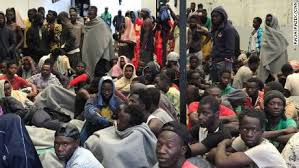
EU Wants to Address African Migrants Issues with €467 Mln Assistance
 The European Union has earmarked €467 million funding to assist vulnerable migrants and refugees and address root causes of irregular migration.
The European Union has earmarked €467 million funding to assist vulnerable migrants and refugees and address root causes of irregular migration.
The new support measures in the Sahel/ Lake Chad region and the Horn of Africa will foster stability, jobs and growth, especially for young people and vulnerable groups.
They complement ongoing bilateral and multilateral efforts, such as through the Joint African Union – European Union – United Nations Task Force.
The new financial assistance provided by the EU Trust Fund for Africa will allow for live-saving assistance to be taken forward, including accelerating resettlements of refugees from Niger as a priority.
EU foreign policy chief Federica Mogherini said: “We continue working to save lives, provide safe and dignified returns and legal avenues, and tackle the root causes of migration, by creating jobs and growth”.
With the UNHCR, “we have evacuated 1,287 refugees from Libya to Niger, who need to be resettled swiftly now. With the IOM, we helped 22,000 people to return home and provide reintegration assistance”, she added, noting that the new financial assistance will further consolidate EU work towards managing human mobility in “a humane, secure and dignified way”.
For Commissioner for International Cooperation & Development Neven Mimica, the majority of €467 million assistance package will be dedicated towards improving employment opportunities, especially for young people.
The European Union’s work with the UNHCR has so far allowed for 1,287 refugees to be evacuated from Libya to Niger through the Emergency Transit Mechanism, with 108 people having been further resettled to Europe. In parallel, together with the International Organization for Migration, 22,000 migrants stranded along the routes have been assisted to voluntarily return home, where they receive reintegration support.
The EU Emergency Trust Fund for Africa was established in 2015 in order to address the root causes of instability, irregular migration and forced displacement. Resources currently allocated to this Trust Fund are €3.4 billion from EU institutions, European Member States and other donors.
Yet, despite these efforts, the ordeal of migrants in Libya is not over. The UNHCR spokesperson William Spindler told journalists in Geneva Friday (June 1) that more than a dozen people have been killed or wounded by traffickers as they attempted to flee a detention center in Libya on May 23.
The victims were among a group of around 200 Eritreans, Ethiopians and Somalis who were trying to escape. “People were shot while trying to escape, and during attempts to recapture them” in Bani Walid, nearly 200 km south of the capital Tripoli, he said.
The survivors also spoke of “torture, abuse and exploitation at the hands of traffickers”, Spindler said, adding that some had been detained for up to three years.
Spindler described the incident as “the latest horror story coming out of Libya” where people are being held by traffickers in horrific conditions and sold into a life of what is, in effect, modern-day slavery.
